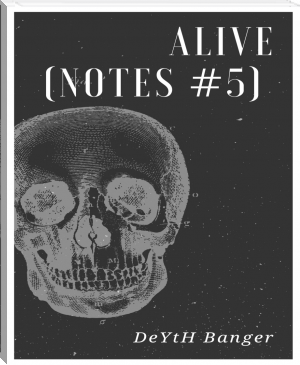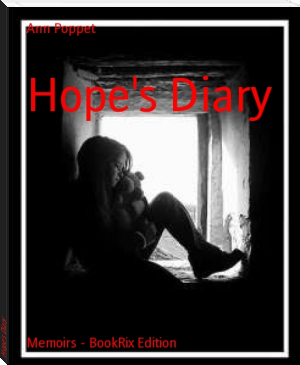Diary 2 by DeYtH Banger (best time to read books .txt) 📖

- Author: DeYtH Banger
Book online «Diary 2 by DeYtH Banger (best time to read books .txt) 📖». Author DeYtH Banger
Dr. Suzuki: And this led you to attempt to contact us?
SCP-2928-13: Yeah. Friend of a friend, yadda yadda, UIU threw me at you guys.
Dr. Suzuki: Oh yes, one more thing. Concerning the propaganda series created in 1984 —
SCP-2928-13: The turtles? I don't know, there was a lot of cocaine involved in their creation.
Dr. Suzuki: Heh. I see. So they do not actually exist, then?
SCP-2928-13: What? Oh. No, they're real. I meant, there was coke involved in their actual creation. The comics were just us covering our asses.
Footnotes1. Includes audio, olfactory, and visual hallucinations.
SCP-1529
Body of a hiker encountered by SCP-1529 on the northern ridge in 19██. Photo taken 17 hours after contact.
Item #: SCP-1529
Object Class: Euclid
Special Containment Procedures: SCP-1529's native environment is to be kept under telescope and satellite surveillance whenever weather and daylight permit. Year-round telescope surveillance is to be conducted from the Foundation's permanent monitoring stations in ███████████, Nepal and ████████████, People's Republic of China. As early in the year as weather permits, a Foundation front company, South Chomolungma Portage, shall establish forward monitoring stations at base camp on the northern and southern ascents, and at the higher camps as weather permits (with the exception of Camp VI on the northern ascent and Camp IV on the southern), to be maintained until weather conditions force the evacuation of the mountain for the season. When SCP-1529 is active, telescope surveillance will be conducted by means of an automatic telescope with a video feed playing at seven seconds delay to avoid a repeat of Incident 1529-2. When necessary and safe, surveillance shall be conducted by airplane or helicopter.
The Foundation shall liaise with civilian expedition coordinators as necessary to prevent attempts on the summit when SCP-1529 is active. The bodies of any hikers who encounter SCP-1529 are to be removed from the mountain as soon as possible for autopsy and disposal. All SCP-1529 related casualties shall be attributed to natural causes relating to altitude sickness and hypothermia. Any survivors and/or witnesses are to be debriefed and administered a Class-B amnesiac.
Mobile Task Force Psi-29029, ("Alpine Echo") shall remain on standby at all times at the Foundation monitoring station in ███████████. During tours of duty, all members of the MTF shall remain at all times in a pressurized environment acclimatized to 7,900 meters above sea level. In the event that a recurrence of Incident 1529-1 occurs, Alpine Echo shall deploy to the mountain by helicopter and attempt Procedure Boukreev.
Description: SCP-1529 is a humanoid individual residing near the summit of Mt. Everest in Nepal, above the 8,000 meter "death zone" mark where human acclimatization is believed to be impossible. SCP-1529 appears to be of average height and weight and is dressed head to toe in what resembles standard mountaineering wear and boots, colored white. SCP-1529's face is entirely obscured by the hood of its parka and what appears to be an oversized pair of opaque black mountain goggles. SCP-1529 has never been observed to wear any other clothes. As very few living people have observed SCP-1529 except through a telescope, it is not known whether its coverings are clothes or part of its body, or what it may look like underneath (except as per Interview 1529-1.)
The Foundation became aware of SCP-1529 in the 1970s when annual expeditions to the summit of Mt. Everest became commonplace, and rumors began to circulate in the mountaineering community about a "monster" near the summit. Photographs found undeveloped in George Mallory's1 camera after the discovery of his remains in 1999 indicate that SCP-1529 was present and active by the time of his attempt on the summit, and was not then significantly different in appearance than it is today. (Foundation media assets have reported that Mallory's camera was never found, and that his death was the result of a fall.)
During periods when daylight is sufficient and cloud cover allows for surveillance of the mountain, SCP-1529 is on average observable ██% of the time. For ██% of that time, SCP-1529 is "inactive", and lies or sits motionless. Recorded periods of inactivity have extended from 17 minutes to (possibly) 8 months; median period of inactivity is 23.4 days. When "active", SCP-1529 can be observed to climb about the upper reaches of the mountain and summit in no discernible direction. SCP-1529 has never been observed to use any tools or climbing aids other than its hands or feet, and while travelling along established climbing routes will ignore the existence of guide ropes or ladders that have been installed by previous climbers. SCP-1529 has demonstrated an ability to climb or descend sections of the mountain's face believed impassable to conventional mountaineers, has never been observed to fall or lose its grip, and is seemingly unencumbered by sub-zero temperatures, high winds, thin air, or low atmospheric pressure. The cause of its becoming active or inactive is unknown, and shows no correlation to weather, time of day, traffic up the mountain, season, or time of year. SCP-1529 has never been observed to descend below the 8,000 meter mark (except as per Incident 1529-1.) Documented periods of activity have extended from 3 hours to (possibly) 6 days; median documented period is 15.2 hours. Nighttime observation of SCP-1529 has thus far proved impossible. Infrared imaging has shown no difference in temperature between SCP-1529 and the surrounding mountainside.
If human climbers ascend past the 8,000 meter mark while SCP-1529 is active, it will attempt to make its way towards them and interpose itself between them and the summit or camp. SCP-1529 seems to prefer to target solo climbers or climbers that are significantly ahead of or behind the rest of their group, but will target individuals within a group if such an opportunity does not present itself. Once SCP-1529 is within eyesight of a traveller it will attempt to gain his/her attention and cause the traveller to make eye contact with it, which induces a hypnotic effect in the victim. The victim finds it very difficult to break eye contact with SCP-1529 and will begin to feel very warm and comfortable, and enticed to sit down and relax. Once the climber has stopped moving, SCP-1529 will close range with the climber and [DATA EXPUNGED]. Death from hypothermia appears to occur within 1-2 hours of making eye contact with SCP-1529, much more quickly than is typical for climbers stuck near the summit. After death, SCP-1529's victims experience an extremely accelerated state of decay: after several hours or days, bodies have become rotted and mummified in levels comparable to bodies that have lain exposed on the mountain for several decades.
Of the approximately 220 people who have died in the high altitudes of Everest since 1924, SCP-1529 is believed to have accounted for at least ███. █ people have survived encounters with SCP-1529, almost all (except as per Interview 1529-1) due to another mountaineer assisting the victim before SCP-1529 made physical contact. SCP-1529 does not appear to be capable of entrancing more than one climber at a time; however, physical encounters between SCP-1529 and more than one person have been noted to lead to [DATA EXPUNGED]. Purpose and motivation for SCP-1529's behavior is unknown; see Interview 1529-1 for speculation.
INCIDENT 1529-1: On ██/██/19██, SCP-1529 entered Camp V on the northern approach, at 7,775 meters, and [DATA EXPUNGED]. ██ casualties occurred, including both Foundation personnel operating the Camp V monitoring post. Foundation assets in the media attributed the deaths to a sudden storm and poor planning on the part of expedition coordinator ███ ████, who was among the deceased. SCP-1529 had not been under observation at the time due to its having entered active phase sometime during the night, and had not yet been located on telescope. To date this is the first and only documented instance of SCP-1529 travelling below the 8,000 meter mark or entering any camp while inhabited.
INCIDENT 1529-2: On ██/██/20██, Agent ██████ in the permanent facility in China, engaged in telescope surveillance of SCP-1529 while it was active near the summit of the mountain. ██████ reported that SCP-1529, while facing in the direction of the base, looked directly in the direction of the telescope. ██████ immediately reported symptoms consistent with an SCP-1529 encounter and reported that SCP-1529 had begun descending the mountain in the direction of the permanent facility. ██████ was unable to pull himself away from the telescope and had to be manually restrained and sedated 17 minutes after beginning of encounter, whereupon he was rushed to facility sickbay and found to have a core body temperature of 27°C and signs of frostbite in the fingers and toes, despite having remained indoors at a room temperature of 24 °C for the duration of the encounter. Agent █████, who attempted to resume surveillance after ██████'s illness, found SCP-1529 still descending the mountain and encountered similar symptoms. Telescope surveillance was discontinued until ██/██, when aerial surveillance confirmed that SCP-1529 had ceased to descend and had entered an inactive state.
INTERVIEW LOG 1529-1
- Hide log
Interviewed: L██████ ████, hereafter "L."
Interviewer: Agent █████
Foreword: On ██/██/20██, L. was reportedly killed during an encounter with SCP-1529 when it abruptly became active shortly after L. had reached the mountain's summit. However, L. was found alive when another team reached his position nearly two days later, and was removed safely from the mountain. He required fingertip and toe amputations due to frostbite, but is otherwise making a full recovery. The following is an excerpt from L.'s debriefing prior to his discharge from hospital.
<Begin Log>
█████: Tell me about what happened when you encountered the creature.
L.: It can't have been more than ten minutes after I left the summit, about 1300. That's the hardest part of the climb. You've reached the top and you're exhilarated and proud of yourself, and then you realize you've just done the most difficult thing you've ever done in your life - and you have to do it all over again, right now, backwards, or you'll end up like Green Boots.2 The others were five or six meters ahead of me - I'd been delayed a moment to adjust my hood. That's when I saw it come over the ridge.
█████: What was your reaction when you first saw it?
L.: Surprised, to say the least. We hadn't been told there was anyone else climbing to the top that day. I thought he must have come over from the other side, or gotten left behind by his mates. I shouted and waved my hands in the air to try and get his attention.
█████: What happened when you got its attention?
L.: 'E looked right at me, and that's when it started. I suddenly felt… happy? Relieved? It was like right away all the pain and the soreness and the chill was gone. I didn't have blisters on my feet and I could feel the tip of my nose again. It was like I was back in ██████████ kicking up my feet by the fireplace, like I could forget all my worries and enjoy a well-deserved rest. But…
█████: …But?
L.: It didn't feel right. Have you ever heard of paradoxical undressing? When your body starts to cool down, really cool down, your blood vessels dilate and you start to feel like you're warming up. So you start tearing off your clothes because you feel like you're





Comments (0)